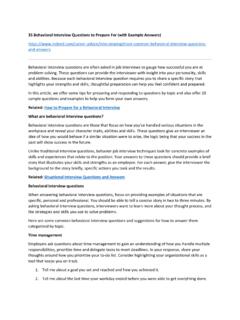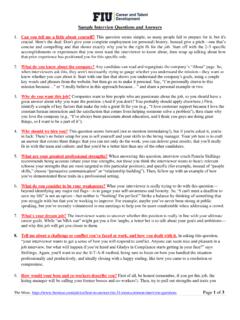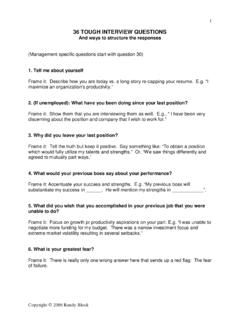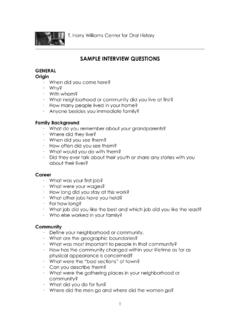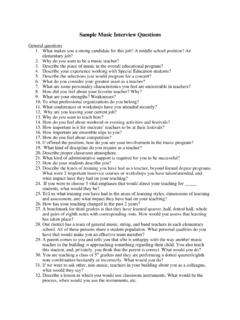Transcription of Competency Based Interviews with Sample Questions and …
1 Publishers Note Apart from any fair dealing for the purposes of research or private study, or criticism or review, as permitted under the Copyright, Designs and Patents Act, this publication may only be reproduced, stored or transmitted, in any form or by any means, with the prior permission in writing from the publishers, or in the case of reprographic reproduction in accordance with the terms of licences issued by the Copyright Licensing Agency. Enquiries concerning reproduction outside those terms should be sent to the publishers. Anson Reed Ltd, Golden Cross House, 8 Duncannon Street London WC2N 4JF Anson Reed Limited and The publisher makes no representation, express or implied, with regard to accuracy of the information in this book and cannot accept any legal responsibility for any error or omissions that may be made.
2 Competency Based Interviews 1 ompetency Based Interviewing is now widely regarded as the most popular technique for employers to use. In fact the Chartered Institute of Personnel and Development (CIPD) recently reported that 78% of Interviews are now Competency Based . They are reported to give more accurate hiring decisions however for many candidates they can be a real challenge. In this guide I provide you with advice along with some Sample answers. Use these as a tool when formulating your answers with your own real life examples. The Basics Competency Based Interviews (CBI) are sometimes called Structural Interviews , Behavioural Interviews , or Evidence Based Interviews . Whatever the terminology, the common aim is to use specifically targeted Competency Questions to discover whether or not an applicant matches the requirements of the position.
3 In your CBI the employer will explore particular skills, or competencies, as they are formally called. While traditional Interviews involve random open questioning, these Interviews are more systematic, with each question targeting a specific Competency . The Questions themselves are phrased in a very specific way designed to elicit how you behaved during a particular situation. In preparing for a CBI the interviewer will build a list of Questions relating to each of the required competencies. Typically you should expect from 1 to 3 Questions per Competency with additional probing Questions . These will draw out the information necessary to establish whether a candidate will be likely to fulfil the needs of the job. This system concentrates on the actual capabilities of a job candidate rather than being open to the individual and possibly arbitrary opinion of a single interviewer who may have a personal bias Based more on gut feeling than substantive fact.
4 C Competency Based Interviewing removes the risk of personal bias and makes the hiring process fairer. Competency Based Interviews 2 The History Since the mid 1980s Competency frameworks have been recognised as extremely important in the context of staff recruitment. The Competency framework sets out the specific skills required for adequate and effective performance in a job. The use of competencies was seen as a way to standardise the measurement of performance and to help with training and improving the skills of existing staff in an organisation, and then became even more important as an aid to staff recruitment. The benefits include a more accurate selection of candidates, and a better performing workforce. Competency Based Interviewing helps to standardise the process and remove personal bias from the more traditional type of interview process.
5 Competencies Explained Put simply, competencies are the skills, knowledge and behaviours needed to deliver a successful performance in a job. There can be anything from six core competencies and upwards required in most roles and these will be detailed in the employer s Competency Framework. Competencies are often categorised as follows*: Core Competencies Personal Competencies Managerial Competencies Achieving Results Analytical Thinking Attention to Detail Building Relationships Communication Coping with Pressure Creativity (Conceptual Thinking) Customer Focus Decision Making / Judgement Negotiation Organisational Awareness Persuading and Influencing Planning and Organising Problem Solving Adaptability and Flexibility Determination and Drive (Resilience) Empathy and Sensitivity Initiative Interpersonal Motivation / Commitment Professional integrity Respect for Diversity Self Confidence and Assertiveness Vigilance and Situational Awareness Conflict Management Developing / Empowering Others Financial Management Leadership Operational Management Project and Change Management Strategic Thinking / Vision Competency Based Interviews 3 Team Working (Collaboration) Technological and IT Awareness * Taken from the InterviewGold Competency Dictionary The Questions It might feel like a conversational encounter but Competency Based Interviews are in fact extremely structured.
6 Each candidate is usually asked the same Questions in the same order and with the same amount of time and prompting. This keeps the interview process fair to all candidates. Answers are noted and then scored. The exact Questions asked will vary and are targeted at those competencies seen as essential to the role you are applying for. Competency Questions require you to provide specific examples of how you dealt with a situation and usually start with: Tell me about a time when Give an example of a situation Describe a Probing or Follow On Questions A word about probing Questions : Be prepared for probing or follow on Questions exploring your answer in more detail. These are designed to find out what you were thinking, what your motivations were and what process you followed. For this very reason we caution against using Sample answers or stock answers; with some carefully targeted probing Questions you may be found out.
7 Here are some probing Questions for the Competency of Problem Solving: How was this problem affecting others? Why did you regard this problem as significant? You can often work out the Questions by studying the job description and person specification. Competency Based Interviews 4 What obstacles did you encounter when resolving this problem? What information did you use to resolve the problem? What resources did you call on to help? What did you learn from this situation? What would you have done differently? Scoring Used In Competency Based Interviews Decisions will be made Based on evidence and this is why the examples you use should be selected carefully. They must demonstrate the positive behaviours required. Organisations will score and assess in different ways and here is a Sample scoring sheet used by a large UK employer.
8 Score No evidence or responses fail to meet requirements 0 Little evidence of positive behaviours High level of negative behaviours shown 1 Some evidence of positive behaviours Some level of negative behaviours shown 2 Good evidence of positive behaviours Low level of negative behaviours shown 3 Strong evidence of positive behaviours Few/no negative behaviours shown 4 Total Score Awarded CLICK HERE TO GET INSTANT ACCESS TO 500 Competency Questions AND BRILLIANT ANSWERS FROM INTERVIEWGOLD >> Competency Based Interviews 5 How to Answer Most Competency Based and Behavioural Questions require you to give a real-life example of a past situation you have been involved in. This sounds straightforward however it is very easy to give a long rambling answer resulting in a low score. Your response needs to be relevant and sufficiently detailed to show that you understand what is required, that you possess the core Competency and can use it effectively.
9 The key to an effective and top scoring Competency answer lies in its structure and there are two standard formulas we recommend using, the STAR or IPAR formulas. Both are very similar and in summary: STAR IPAR S = Situation T = Task A = Action R = Result I = Introduction P = Problem A = Action R = Result Feel free to use the STAR if you are familiar with it however the IPAR technique is favoured by us. The key difference is that IPAR starts with an Introduction which should summarise the success in a strong single sentence. For example: During the past 12 months, I devised, implemented and delivered a cost reduction programme resulting in savings of over 25% across the department. This is a powerful sales statement which will stay in the interviewer s mind throughout. It sets the scene and grabs their attention and they will automatically want to hear more.
10 Approach each answer as if you were recalling a story with a definite start, middle and end. Competency Based Interviews 6 Sample Answers Using IPAR Formula Over the next pages you will find Sample answers* using the IPAR formula. These have been taken from the InterviewGold Online Training system. You can use these with the STAR method too as they will fit with both equally. As with any Sample answer we discourage their use directly in an interview . Instead you should respond with examples Based on your own individual experience. In this way you will be able to answer the probing and follow on Questions with ease. * Please note these are generic examples however InterviewGold Online provides you with template Sample answers which are specific to your role. Use these templates alongside the powerful Answer Builder feature to create your own expertly crafted answers.

